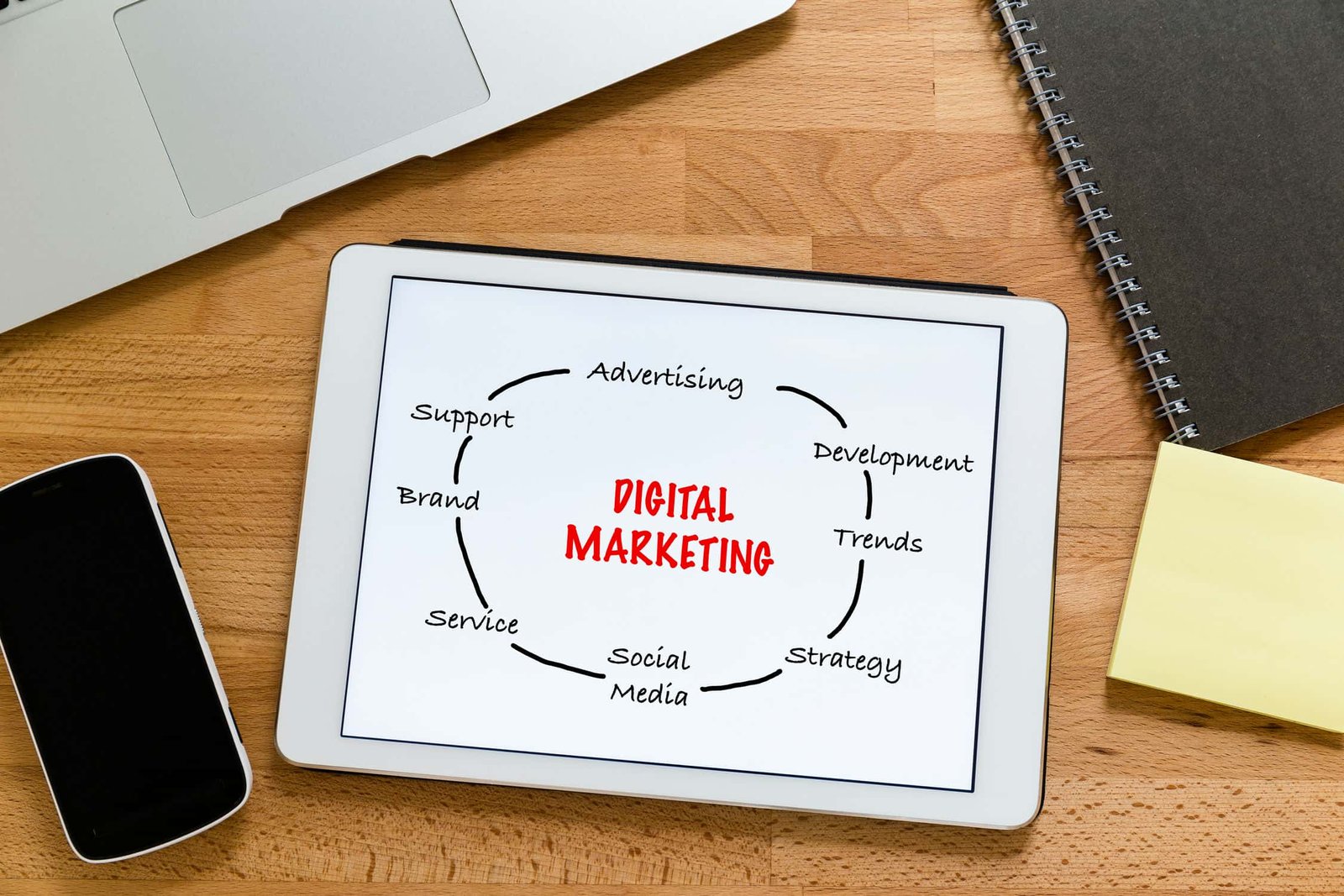Digital marketing strategies involve employing tools and technologies to achieve business goals such as lead generation, brand recognition and sales.
Digital marketing professionals must stay current on industry best practices by reading reliable blogs and attending industry conferences.
What Is Digital Marketing Strategy?


Digital marketing can be an extremely effective means of connecting with your target audience, helping build brand recognition, increase customer engagement and drive sales and revenue growth. Digital marketing should be considered an integral component of any business strategy; yet its complexities can sometimes prove challenging to navigate.
A digital marketing strategy is a detailed plan designed to achieve specific online goals through digital channels and tools like social media, search engine optimization (SEO), email, and content marketing. A digital marketing strategy should not be confused with a marketing campaign; which typically has a specific start and end date and often serves as part of overall strategy implementation.
To create an effective digital marketing strategy, it’s crucial to gain an in-depth knowledge of your customer base and craft a customized message for each group of consumers. B2B customers may prefer shareable and downloadable marketing materials while B2C clients usually prefer closer personal connections between brands and individuals.
Types Of Digital Marketing Strategies


Each digital marketing strategy comes with its own set of benefits. They can help businesses become more customer-centric while simultaneously increasing business growth. Furthermore, digital tools can assist businesses in generating new customers while maintaining existing ones, thus improving customer retention rates.
However, it is essential that you choose the appropriate strategy for your company. Always bear your wider business goals in mind when selecting a marketing strategy; additionally, think about its effect on sales and ROI when making this decision.
Digital marketing provides another advantage over traditional forms: its ability to track campaign performance in real-time and make adjustments based on real-time feedback. Traditional methods don’t offer this level of flexibility or agility – compare sending product brochures through people’s letterboxes versus posting ads online! With all this data at your disposal, creating more targeted ads that convert potential buyers is much simpler with digital.
Developing A Digital Marketing Strategy


Digital marketing strategy is an in-depth plan designed to help businesses use online channels effectively in achieving specific business goals. This strategy must take into account your company’s demographics, strengths and weaknesses as well as competitors as well as conduct an in-depth study of your target audience’s online behaviors and preferences.
Before beginning implementation of any digital marketing tactics, creating a digital marketing strategy should be completed as part of a thorough plan. Doing this allows you to set short and long-term marketing goals that align with the overall business objectives for your company, while giving clear direction for your team so they don’t make costly errors that compromise return on investment (ROI).
To create an effective digital marketing strategy, begin by identifying your company’s core competencies and selecting which online channels would best serve it – this may include owned channels like your website and email as well as earned or shared channels such as social media and music streaming platforms. Also take into consideration paid channels that may help reach your audience with targeted messaging.
B2b Digital Marketing Strategies


Digital marketing can be an invaluable asset to businesses that aim to engage and communicate with prospective clients. Furthermore, this form of promotion enables organizations to assess the efficacy of their strategies as well as make adjustments based on results produced. However, B2B digital marketing requires consistent effort over an extended period in order to meet its desired goals and goals.
Successful B2B digital marketing begins with extensive research and data analysis. This can provide marketers with an in-depth analysis of how their competitors are approaching their target audience and the type of content that engages them, while also uncovering any gaps that can give an edge over competition.
A B2B digital marketing strategy must focus on meeting the needs and buying behaviors of business audiences. Additionally, an understanding of buyer journey should also be considered when creating this digital strategy. Influencer marketing may also help B2B companies reach potential customers; large or small audiences alike could potentially benefit from being exposed to your product/service via these influencers who produce relevant content that relates directly to target businesses.
Digital Single Market Strategy


The Digital Single Market (DSM) is an online European marketplace that enables consumers and businesses to access services seamlessly across borders under fair competition conditions and high levels of consumer and data protection. It aims to support Europe’s economy while improving public services while simultaneously eliminating remaining obstacles to online activities like geoblocking and copyright issues.
In 2015, the Digital Single Market Strategy (DSM) was adopted, consisting of three key pillars. They are improving access for citizens and businesses to digital goods and services; creating optimal conditions for digital networks and services to thrive; and optimising growth potential of the digital economy. Since then, legislation initiatives have been undertaken by the Commission in support of this mission.
One such measure is a new rule that reduces geoblocking barriers for digital content purchases by consumers and harmonizes rules on single points of contact, but according to an IMCO committee study these measures don’t address fully all barriers created by Member State laws; additionally there is little reliable information regarding Member State regulations available online.
Digital Marketing Strategy Ideas


Your digital marketing strategy should revolve around your company’s key goals. For instance, if your aim is to boost website traffic or drive sales, SEO and content marketing might be essential components. Otherwise, PPC advertising or email marketing might prove more fruitful approaches. Furthermore, an evaluation of existing channels and assets can help determine what assets to keep and which to adjust or discontinue.
Data should also be used to inform your digital marketing strategies. For instance, conducting a customer persona study will enable you to learn about your target audience by uncovering its pain points and motivations for purchasing goods or services – providing valuable insights that will allow for more targeted campaigns and messaging efforts.
An effective way to enhance your digital marketing strategy is conducting a competitor analysis. Doing this can help identify the most efficient tactics for reaching your target audience and creating an actionable plan to reach your goals. Wrike can be used as an organizing platform and performance tracking system.
Digital Marketing Strategy An Integrated Approach


Digital marketing strategies allow companies to reach potential customers online via social media, email marketing, SEO optimization and paid ads – building brands, providing excellent customer experiences and increasing business.
An effective digital strategy involves planning, execution and measurement. It must include an understanding of both your audience and goals as well as creating buyer personas to better understand your customers and aid decision-making processes.
Digital marketing strategies must also be mobile-friendly, including website designs, emails and content optimized for mobile devices. Tracking and analyzing data to determine what’s working can help to optimize campaigns and increase return on investment (ROI). With tools like Wrike you can quickly plan, launch and track marketing campaigns – saving both time and effort while guaranteeing their effectiveness! Interested in knowing more? Check out these topics:
Digital Marketing Strategy Example
Digital marketing trends are always shifting, making it imperative that marketers keep abreast of them to adapt and create strategies that resonate with their target audiences. Furthermore, being up-to-date will allow marketers to identify areas for improvement within their campaigns and better decide on which channels to invest in.
An effective digital marketing strategy requires conducting a comprehensive channel and content audit as its foundational element. Doing this will allow you to assess which digital channels and assets are working, which ones need tweaking, and which need eliminating altogether – saving both time and money while helping create targeted campaigns for target audiences.
Successful digital marketing requires collaboration among teams with diverse skills. Project management software can assist teams by organizing tasks and workflows, streamlining communication channels and ensuring team members use their strengths optimally, leading to more creative solutions and improved project outcomes.